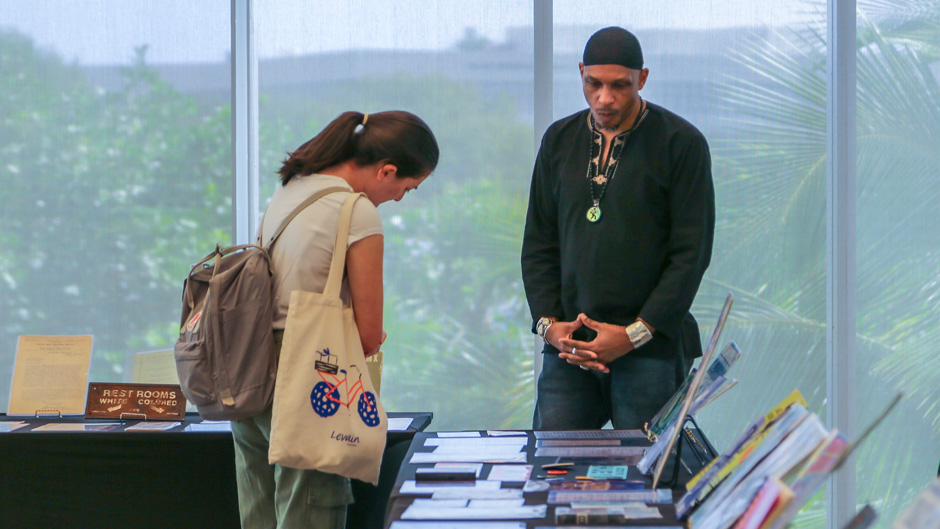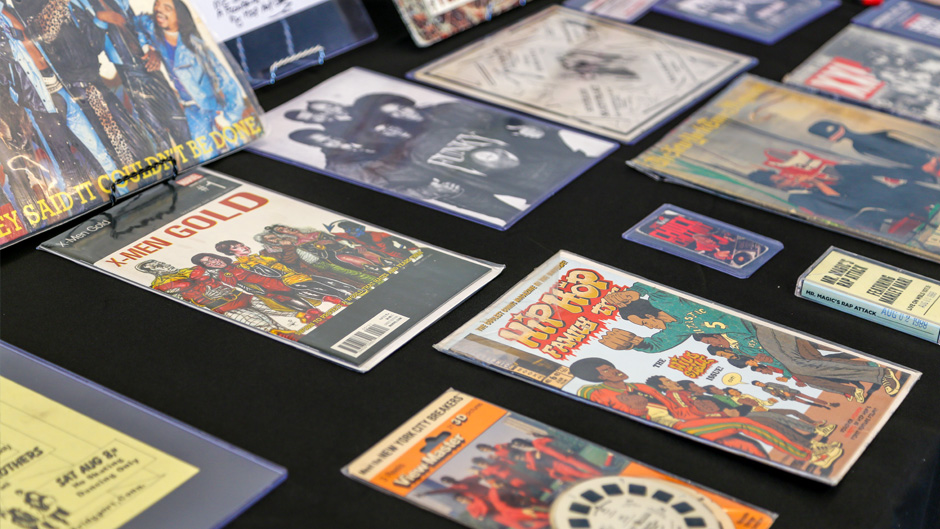Members of the University of Miami community had the opportunity to be exposed to decades worth of artifacts, mementos, and items chronicling Black history in the United States and five decades of hip-hop as part of the Black History 101 Mobile Museum.
Organized by the Office of Academic Enhancement (OAE), the museum was on display at the Shalala Student Center on Thursday, offering visitors an opportunity to hear from Khalid el-Hakim, founder and curator of the museum, about his experience in the hip-hop industry, the influence of the music on pop culture, and how he gathered the mementos on display.
“Artifacts are a way to tell stories that are very powerful. My life’s work has been collecting artifacts and using artifacts as an opportunity to engage people in conversations about history, placing Black people at the center of these conversations,” he said.
El-Hakim was teaching middle school social studies in Detroit in 1998 when he was inspired to pursue a career in the hip-hop industry. He began as a booking agent and artist manager in the business.

While on the road, el-Hakim traveled the country for decades visiting antique shops, flea markets, estate sales, and auctions, acquiring a personal collection of Black memorabilia and showcasing it as part of an interactive exhibit.
The traveling museum is now an award-winning collection of more than 10,000 artifacts of Black history, dating from the transatlantic slave trade era to the hip-hop period. The mobile gallery, featuring many of the artifacts, has visited 41 states and more than 1,000 institutions.
The current exhibit, “Hip-Hop at 50,” provides a unique opportunity to experience five decades of hip-hop culture through rare primary source material showing how the music has made an impact on popular culture.
“Hip-hop was a way that I learned about Black history. I wasn’t getting these lessons in my K-12 experience. But hip-hop took it upon itself to teach lessons about Black history,” el-Hakim said.
With more than 150 items in his collection on display, the exhibit showcases hip-hop culture through the lens of social movements in the U.S.—such as the Black Lives Matter movement, the Million Man March, Stop the Violence, and the Anti-Apartheid Movement.
Visitors walked through several tables of documents, cassettes, autographed posters, buttons, and other items chronicling decades of hip-hop. The display started with items from the 1600s, including a whip and shackle from the transatlantic slave trade, segregation signage from the Jim Crow era, and Black caricature postcards from the 1800s and 1900s.
Delving into the hip-hop scene, relics from legends lined the tables as passersby marveled at the items. Among them, pieces like backstage passes to a 1987 Def Jam tour, an original copy of Queen Latifah’s “All Hail the Queen” cassette, magazines featuring Aretha Franklin and Tupac Shakur, and a handwritten note by the first female rapper, MC Sha-Rock.
“The 150 artifacts on display here on these 10 tables reflect hip-hop’s influence on the world and recognizes that hip-hop was influenced by history,” el-Hakim explained.
On a final table, souvenirs from the Black Lives Matter movement, a magazine cover featuring Breonna Taylor, and even an original business card from then-senator Barack Obama were on display.
Deitrick Natt, a sophomore studying Africana studies and African literature, heard about the event through the Center for Global Black Studies and decided to take the time to visit.
“Looking at the history [of hip-hop] that I was not involved in and seeing how it influences our life and inspires [el-Hakim] is really important, and makes me more aware of our history,” Natt said.
In addition to el-Hakim, Khalilah Camacho Ali, actress and former wife of boxer Muhammad Ali, made a surprise visit to the exhibition and spoke with attendees.
“Sometimes, you don’t know you’re a part of history. You all, right now, are a part of your history today. And you’re going to be teaching your kids about your history in the future,” Ali said to visitors as they explored the tables. “You never know the part that you are taking in history, and you never know it’s happening until it’s over. I appreciate all this history right here. It’s amazing.”
Asia Blocker, a sophomore studying marketing and finance, was excited to see pieces that went beyond the history of the hip-hop industry, including a collection of documents from the Nation of Islam and civil rights leader Malcom X.
“I’m taking a course on Muslims in America, and I really relate to the things we’re learning. I’m excited to tell my teacher about the exhibit—and our surprise guest,” Blocker said.
OAE brought the mobile exhibit to the Coral Gables Campus as part of a series of University celebrations honoring Black History Month. Chris Doell, director of programs of academic excellence for OAE, met el-Hakim in 2018 while attending the National Conference of Race and Ethnicity in New Orleans. Inspired by his work, Doell worked to bring the museum to the University. The traveling exhibit visited the campus once in 2018 but plans to return were derailed by the pandemic.
“I distinctly remember experiencing a full range of emotions as I gazed at items celebrating some of humanity's greatest achievements resting alongside symbols of some of our greatest atrocities,” Doell said. “The Black History Mobile Museum was the most impactful portion of that conference for me, and it felt like something everyone should see,” he added. “We are proud to have Khalid back on campus, sharing his heart and soul with our community.”

